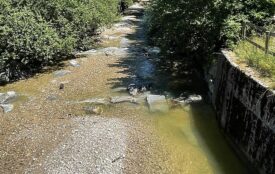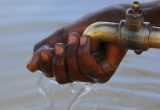Migration pays off for songbirds
Blackbirds that spend the winter in the south are more likely to survive the cold season than their conspecifics in central Europe.
It is estimated that there are over one-and-a-half billion songbirds living in Europe alone. Around half of them embark on their journey southwards in autumn over a period of less than twelve nights. It is warmer there and there is enough food for them. However, the journey to the south is arduous and dangerous. So, is the effort involved worthwhile for migratory birds? Researchers at the Max Planck Institute for Ornithology in Radolfzell have now demonstrated for the first time that the members of a bird species that migrate to winter in the south are more likely to survive than their conspecifics that remain in central Europe.
Blackbirds are known as partial migrants. This means that some of them fly to wintering grounds while others prefer to stay at home and face the harsh conditions there. The milder winters in central Europe today are clearly tempting many blackbirds to spare themselves the stress of migrating. This was probably not a viable option when winters were colder than today. The mechanisms which control the birds’ decision to migrate or stay have not been fully understood yet.
Over the six-month summer period from 2009 to 2016, the team led by study leader Jesko Partecke and Max Planck Director Martin Wikelski temporarily captured almost 500 blackbirds around Radolfzell on Lake Constance so that they could fit them with small tracking devices and ring them in the traditional way. The radio transmitters enabled the researchers to track the birds in the study area for several years: after each winter, the scientists searched the area around Lake Constance for the blackbirds that had survived the winter and had returned from their wintering grounds. Automatic recording devices installed in the study area also indicated whether a bird fitted with a radio transmitter was alive or dead and whether or when it had migrated from the habitat.
The scientist fed their data into a computer program and calculated the probability of survival of the migratory and sedentary birds. Their finding: “Winter is the most critical phase in the life of a blackbird. Most of them die during this period, irrespective of whether they migrate to the south or remain here. However, the migratory birds are considerably more likely to survive the winter than the resident ones,” explains Daniel Zuñiga, first author of the study.
Although more females migrate south than males, no differences were observed between the males and females in relation to mortality. It is likely that many males prefer to stay at home so that they can increase their chances of securing a good breeding ground when conditions improve after the winter and thereby attract a female. As opposed to this, an early presence in the breeding ground may potentially be less important for the females.
Given the considerable effort and expense involved for the Max Planck researchers in keeping track of the birds with their direction-finding antennae, Partecke and Wikelski have set their sights on a revolutionary new technology: the Icarus space-based observation system, which will enable the more detailed tracking of small songbirds, such as blackbirds, by GPS for the first time – and thus also the clarification of what the birds actually do in their wintering grounds, when they return and why they simply do not stay in the south.
This project, which has been initiated by Martin Wikelski among others, is due to be ready to begin from summer 2018. The scientists expect that the data it will generate will provide pioneering insights into the life, behaviour and death of the animals on our planet.
Source







